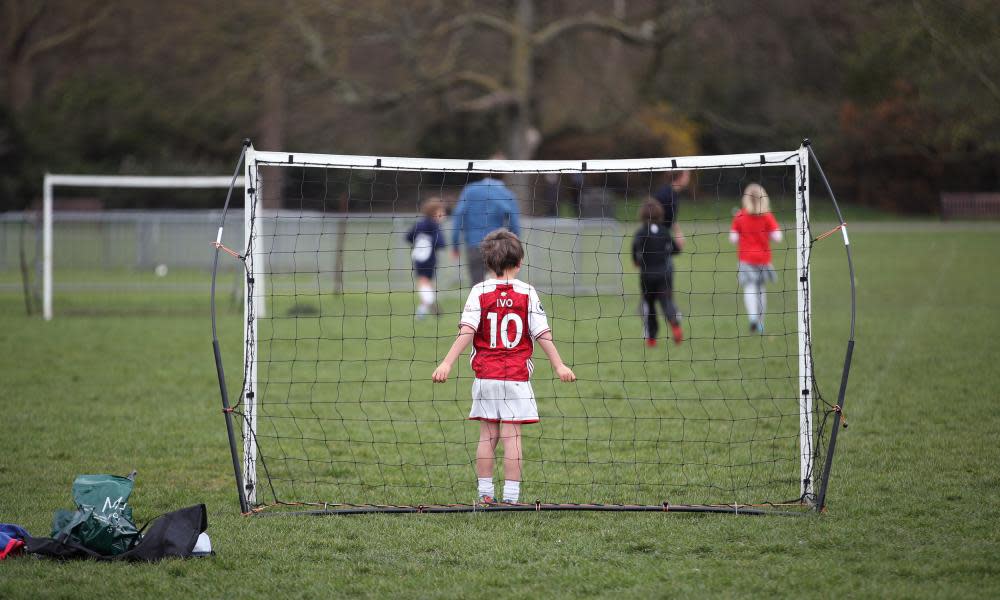Half of UK children playing out with friends less since pandemic

Many children are playing outside less with their friends, playing alone more and are less active than they were before the pandemic, according to a UK survey that will add to concerns about the lasting impact of the lockdowns on children’s wellbeing.
The Save the Children poll found that more than nine out 10 children (92%) felt the way they play had changed since the Covid pandemic. Half (51%) said they were playing outside with their friends less, a third (34%) were playing alone more, and almost a quarter (23%) were playing less sport than before.
More than 30 charities and businesses in the UK, along with child development experts, have joined forces to support a summer of play for children as part of the recovery process after the mental and physical impact of the pandemic.
Among those signed up are the Lego Foundation, Great Ormond Street hospital, the Arsenal Foundation and British Cycling, who will all be offering resources to encourage and facilitate children’s play. Organisers are calling on other organisations and the government to get involved and “take the #SummerOfPlay pledge”.
Child development experts have expressed concern about the government’s “catch-up” narrative for post-pandemic, warning that it focuses too much on academic catching up rather than prioritising children’s play and opportunities to socialise over the summer holiday.
Watch: Lockdown and children's mental health
The government is spending £200m on summer schools aimed primarily at pupils leaving primary school and moving on to year 7 in secondary school. They will offer enrichment activities such as team games, music, drama and sports, as well as academic support.
Helen Dodd, a professor of child psychology at the University of Reading, said: “Play with friends is a central part of childhood. It is intrinsically valuable, bringing fun and joy to children’s lives. It also offers opportunities for learning about negotiation, social skills, emotions and relationships.
“Over the past year, children’s play with their friends has been restricted and there is evidence that their mental health has deteriorated. Amongst all the talk of educational catch-up, it is vital that we don’t forget that children have also missed out on play with their friends, physical activity and fun.”
Earlier this year, a group of academics called PlayFirstUK wrote to the government urging it to ensure that children get time to play this summer. Dodd, a PlayFirstUK lead, said: “This campaign builds on that and is about community action, coming together with a wide range of diverse organisations to give children the summer of play they deserve, to help them catch up on so much of what they have missed this past year.”
The Summer of Play campaign is coordinated by Save the Children, Play England, Play Scotland, Play Wales, Playboard Northern Ireland, PlayFirstUK, Playing Out and others.
Dan Paskins, director of UK impact at Save the Children, said: “Children across the UK and around the world have missed out on so much over the past year. Creating more opportunities for children to play is crucial for making up for some of that missed fun and helping to support their health and wellbeing as we emerge from the pandemic.
“We also know that for people living in poverty, accessing safe places to play can be even harder. We want to focus on creating more opportunities for children from disadvantaged and minority backgrounds who have been disproportionately impacted by the pandemic.”
Anita Grant, the chair of Play England, said: “This campaign is for the next generation’s health, happiness and wellbeing. Playing freely allows brains to think, skills to develop and creativity and imagination to flow. Now is the time to make space for play and to allow children to recover.”
The Save the Children survey was carried out by Beano Brain and polled 4,556 children between the ages of seven and 14 between 29 April and 4 May.
Watch: Attainment gap widens between pre-schoolers

 Yahoo News
Yahoo News 
